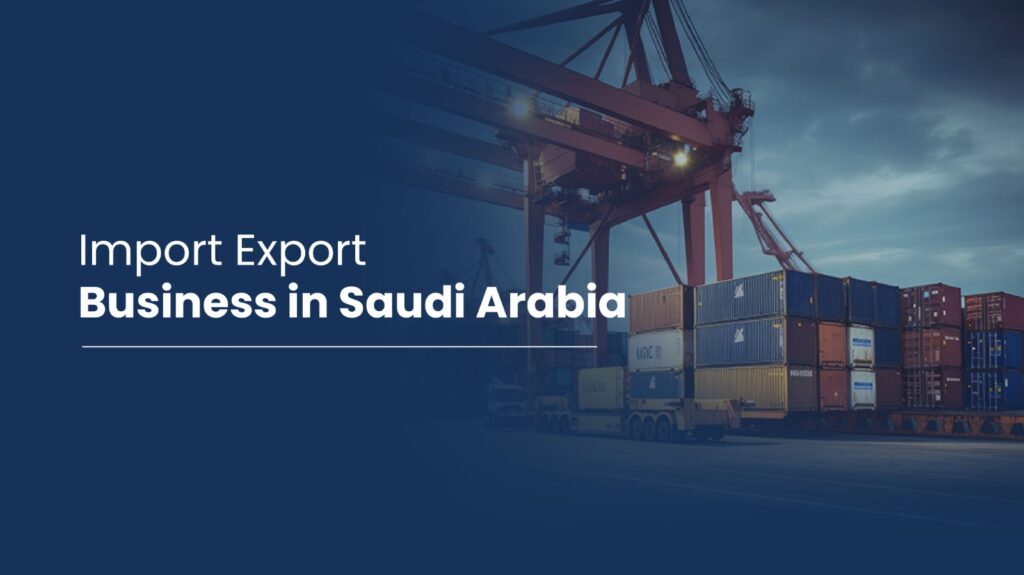Are you someone looking to begin import export business in Saudi Arabia? Then this blog is specially for you. A wide array of opportunities is waiting for you in the kingdom due to its growing market, diverse location, and many more.
As someone with more than a decade of experience in the Saudi Arabian business landscape, Analytix is here with this comprehensive blog to make you informed with all the necessary information regarding the import-export business in Saudi Arabia.
Overview of the Saudi Arabian Import Export Market
The Kingdom of Saudi Arabia is positioned with Coastlines on both the Red Sea and the Persian Gulf and is divided into 13 provinces with Riyadh as the capital city. Saudi Arabia is the key global player in oil and gas production and export as it holds 17% of the world’s proven petroleum reserves. The Kingdom holds business-friendly policies including the allowance of 100% ownership in the trading sector which attracts businesses looking for investment and to explore new export markets.
The abundant oil sector drives high imports such as rice, sugar, tea, coffee, meat, and chicken. There is a substantial need for imports in Saudi Arabia with its large and growing population.
The growing oil and chemical processing industries also requires significant imports of specialized machinery and equipment, and this highlights the dynamic and robust nature of the Saudi-Arabian import-export market.
Major Export Business in Saudi Arabia
Saudi Arabia’s exports are a big deal globally. The key export markets of the kingdom include India, Japan, South Korea, the United States, and Egypt. Now, let us look at the major exports of Saudi Arabia:
Crude Oil
Saudi Arabia is the world’s largest producer of crude oil, with an annual output of about 4 billion barrels. The economic growth of the kingdom is largely influenced by its vast oil and natural gas reserves estimated to be around 265 billion barrels. In May 2020, KSA exported an approximate 6 million barrels of crude oil per day with over 600,000 barrels exported to the US.
Polymer Ethylene
Saudi Arabia plays the lead in exporting LLDPE (Linear Low-Density Polyethylene) to China, shipping 38,650 tons. From 2018 to 2019, the polymer exports of Saudi Arabia to China increased by about 30 % and in 2021, KSA was one of the top polymer exporters.
Mineral Products
KSA has a diverse mineral export market with significant reserves of various minerals, including gas, copper, gold, and bauxite.
Chemical Products
Saudi Arabia is a key player in the global chemical industry with the export market of a variety of chemical products.
Plastics and Rubbers
The Kingdom exports substantial quantities of plastics and rubbers which are essential for various manufacturing processes worldwide.
Metals
Saudi Arabia holds abundant mineral resources making it one of the important export businesses of the kingdom.
Transportation Equipment
The kingdom also exports transportation equipment and has proven to be a country of strong industrial capabilities.
Major Import Business in Saudi Arabia
Saudi Arabia plays an important role in the global import market with a wide range of imported goods, diverse economic needs, and limited domestic production in certain sectors. The kingdom primarily imports from countries including UAE, India, Germany and Switzerland.
Below are the major import businesses of Saudi Arabia:
Rice
Saudi Arabia imports agricultural products to meet domestic consumption needs. This helps to cover the deficit in domestic food production due to unfavorable agricultural conditions. In 2014, Saudi Arabia became the largest importer of rice among GCC countries with an import value of 67 billion (1.4 million tons).
India and Pakistan are the primary suppliers of rice (mainly basmati), accounting for 90% of kingdom’s rice imports. The import market offered by KSA presents significant opportunities to exporters.
Seafood
The kingdom is one of the major markets for seafood imports due to rising domestic consumption and food production deficit. Saudi Arabia holds an import percentage of its food, highlighting food security concerns of the nation.
The price rates of seafoods are increasing and this indicates a growing demand along with offering opportunities for nearby exporting countries.
Tea and Coffee
Saudi Arabia is a key participant in the growing global market of tea and coffee consumption. In 2020, the country imported approximately 60,000 tons of tea and 220,000 tons of coffee, primarily from Brazil. The kingdom also offers market opportunities to other coffee and tea-producing counties like Vietnam, Indonesia, India and Malaysia.
Machinery and Equipment for Oil & Gas and Energy Sectors
The oil and chemical processing industries of the kingdom require large amounts of specialized machinery and equipment. Saudi Arabia offers prime opportunities to manufacturers and trading companies from China, India, and Europe.
How to Enter Saudi Trade Market?
With a growing economy and strategic location, Saudi Arabia’s import-export trade market presents significant opportunities to investors and businesses. For entering the Saudi market successfully, you can choose one of the following options:
Partnerships:
You can collaborate or partner with a local Saudi business to explore their market knowledge and established network.
100% Ownership:
Establish a fully owned entity to have complete control over your business operations in Saudi Arabia.
How to Start import export business in Saudi Arabia?
The Saudi Arabian import market presents exciting opportunities for international businesses. You can start a successful import-export venture in Saudi Arabia by conducting thorough research, following regulations, securing reliable business partners, and building effective marketing strategies.
Steps to begin your import business in Saudi Arabia
Conduct Market Research and Choose Products:
An investor needs to research the market he intends to venture into before he sets out to import goods into his country. Learn from the products that make customers demand more with little competition if one is to make good sales.
- Understand Consumer Trends: Conduct research on Consumer Attitude and trends in Saudi Arabia and the source of information should include Government reports, specialized magazines, journals, and e-commerce websites.
- Identify Market Gaps: It would be helpful to observe existing businesses closely to identify missed opportunities in a certain product line. Thus, it is of paramount importance that the company can look at demographic aspects of the market, cultures, and segments that have not been well explored.
- Demand Analysis: Given that it is a mature market, analyze the level of demand by examining trends in trade statistics of the importing and consumer countries by using online market reports and research findings.
Get to know more about import and compliance laws
Saudi Arabia possesses severe regulations required for imports, as well as strict measures taken on safety issues.
- Customs Requirements: Learn about the Saudi Arabian General Authority of Customs that deals with fees such as duties and taxes and what is forbidden and allowed to import.
- Product Standards: Ensure they meet the Saudi Standards, Metrology and Quality Organization Codes, Regulations and Standards. SASO/SABER is often required for many products when importing into Saudi Arabia.
- Specific Regulations: Products and services must adhere to certain standards for certification, for example, foods must be Halal certified, Cosmetics must be SFDA certified, and electrical appliances should have energy efficiency labels.
Get the Necessary Trade License and Set Up Your Business
Another regulatory requirement is the commercial license, obtained from the Ministry of Commerce to act as an importer.
- License Types: In general, to import goods you may need a general trading license or a specific import license, depending on the nature of your business and your import turnover.
- Local Presence: However, it should be noted that while local presence is not necessarily expected, it can be useful in the business sense as it improves operations and approaches partners with credibility.
Find Reliable Suppliers and Negotiate Terms
- Identify Core Vendors and Bargain Theories: Avoid compromising the whole procurement process for instance having to deal with middlemen, it is advisable to look for reliable suppliers and negotiate the terms.
- Supplier Research: Online directories, trade missions, and trade associations can be found on the internet, and they can be used to identify potential suppliers.
- Quality Checks: Holding suppliers accountable to make sure they adhere to the SASO compliance requirements. However, by ordering from Verger Group, one can provide them with all the necessary certifications.
- Negotiation: Manage the purchase price, payment terms and delivery terms (that would capture the supply chain risk). The specification of terms of the agreements to ensure better understanding.
Plan Logistics and Handle Customs Clearance
Efficient Logistics and careful customs procedures are significant when transporting goods in and out of one country to another.
- Delivery Methods: Determine which delivery channel is the most viable in terms of the price and speed; options are maritime, aviation or ground transportation.
- Customs Clearance: Co-operate with an experienced customs broker to provide proper documents and facilitate authorization.
- Insurance: Use insurance services for safeguarding the properties shipped, in case the shipment is lost or damaged.
Build a Distribution Network and Market your Products:
Once the business starts to function, a distribution network should be set up and the marketing plan should be outlined.
- Distribution channels: When targeting your market, you should think about wholesalers, retailers or e-businesses.
- Marketing: Develop an online and social media campaign that specializes in reaching out consumers with local influencer collaboration.
Steps to begin your export business in Saudi Arabia
The export process involves several interconnected steps. To export successfully to Saudi Arabia, you need to understand each step thoroughly:
Negotiate and Sign a Contract
- Customer Engagement: The efforts to capture a particular market and convert it to a customer begin from the moment you have a prospect. Engage and enter into a trade agreement.
- Negotiation Tips: The Saudis are good bargainers, and therefore, they shouldn’t be pressured into making a deal. As noted above, the use of path dependency implies the internationalization process is slow and bureaucratic.
- Contract Signing: If the buyer agrees with the proposed terms, ask them to sign the contract, and then give them a proforma invoice along with a request for at least 20% advance payment.
Apply for an Export License
- License Necessity: This provides legal backing to your export business since an export license validly authenticates your transactions. Certain products may not warrant a license and could be influenced by the approval of the country you reside in.
- Document Translation: All documents should again be provided in Arabic if there is any need that demands so.
- Special Permits: Endangered species like animals or relics like antiques may require special permits to be transported across a border.
Book and Get an Empty Container
- Reservation: It is important to take up space with a shipping line or forwarding company.
- Choosing a Company: To have a good experience and avoid last-minute disappointments, it is advised that one selects a reliable company and books as early as possible.
- Cost Comparison: Compare offers from multiple providers to get the best deal.
- Container Needs: Full containers may not always be necessary.
Prepare and Check Export Goods
- Delivery Planning: Pursue delivery after receiving initial payment.
- Quality Assurance: Guarantee the product reflects the quantities and the quality required in the contract.
- Verification: Check export permits, the regulations of the intended destination port, and any additional expenses.
- Documentation: Secondary check the packing list, the net weight, and perhaps fill out the appropriate documents, such as the MSDS.
- Special Products: In case you are exporting goods that fall under OOG you need to make sure that you have the appropriate export license.
Package and Mark Shipment
- Secure Packing: Make sure that all articles purchased are packed safely and marked with an authentication document stating the source of the products.
- Shipping Addresses: Always fill in the shipping addresses in the correct manner and the packing list should also be well detailed.
- Payment Confirmation: Therefore, do not make your shipment if you are not paid entirely.
- Invoice Details: It is important to ensure that commercial invoices for the goods shipped are described properly.
- Bill of Lading: Provide three signed copies, including vessel name, shipping date, and manufacturer/exporter addresses.
Buy Shipment Insurance
- Insurance Importance: The role of insurance in transport in the international transport business is important in managing the risks involved.
- Certificate Details: The insured amount, goods description, name of ship, port are some important information that must be recorded in the insurance certificate for proper identification of the insured consignment.
- Exporter Responsibility: Thus, the exporter is required by law to submit such a certificate to the importer.
Complete Customs Procedures (for Importer)
Importer’s Role: The importer organizes the customs formalities however he wants full papers from the exporter. Required documents are:
- Customs declaration
- Commercial invoice
- Bill of lading
- International freight bill
- Certificate of origin
- Other credentials related to specialized inspection (if necessary)
- Other annex documents such as quality, analysis, or health certificates
- Additional Copies: The necessary documents for the trip include the sales contract, packing list and other documents; more copies should be obtained.
Documents Required to Import into Saudi Arabia
Before commencing importation into Saudi Arabia, importers must submit the following documents:
- A commercial invoice
- A bill of lading or B/L is the most important shipping document that proves and accounts for the receipt of the goods shipped by the shipper or the seller.
- A certificate of origin is another important document that means a competent authority attests to the origin of goods and when this authority is an embassy or a consulate, it is called an embassy certificate or Consular Certificate.
Additionally, depending on the nature of the imported goods, importers may need to provide further documentation such as
- A certificate issued by IECEE for goods, which ought to be accredited with this certification.
- The registration of the products of any organization to the respective governmental bodies if required in any given market.
As mentioned, each product category has certain criteria that may be applicable. Further, importers must perform the FASAH clearing procedures where they are supposed to submit the relevant documents and complete the customs declaration form before the imported goods enter the port of entry by at least 48 hours (about 2 days). This process allows you to follow the shipment in customs or even before the shipment arrives allowing notification of shipment arrival.
Conclusion
How did you feel reading our blog?
We hope you enjoyed it.
Were you able to get relevant information about import-export business in Saudi Arabia?
Are there any points you think we should have discussed?
If yes, please let us know in the comments.
We are looking forward to hearing your review.
Happy reading!
- FAQs
Frequently Asked Questions
If your question is not addressed here, please feel free to reach out to us. We value your inquiry.
What are 3 major imports of Saudi Arabia?
The three major imports of Saudi Arabia include oil and petroleum products, chemicals and food products. These are crucial for the country’s infrastructure development, food security, and industrial needs.
Is Saudi Arabia good for import export business?
Yes, Saudi Arabia is a promising market for import-export business due to its strategic location, strong economy, and investment in infrastructure. The country’s Vision 2030 initiative aims to diversify the economy, creating new opportunities for trade and investment.
What products does Saudi Arabia import and export?
Saudi Arabia imports machinery, food products, and chemicals. On the export side, the country is known for its vast oil and petroleum products, as well as plastics and chemicals.
























